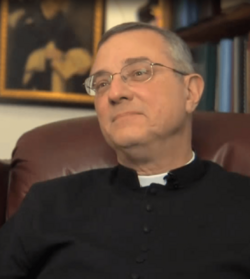Anthony Cekada facts for kids
Quick facts for kids The Reverend Father Anthony Cekada |
|
|---|---|
| Traditionalist Catholic Priest | |
 |
|
| Church | Saint Gertrude the Great |
| Orders | |
| Ordination | 29 June 1977 |
| Personal details | |
| Born | July 18, 1951 San Diego, California, US |
| Died | September 11, 2020 (aged 69) West Chester Township, Ohio, US |
| Nationality | American |
| Denomination | Roman Catholic |
| Alma mater | The International Seminary of Saint Pius X, Écône, Switzerland |
Anthony J. Cekada (July 18, 1951 – September 11, 2020) was an American Catholic priest and writer. He was known for his strong belief in Sedevacantism, which means he believed the popes after the Second Vatican Council were not true popes.
Contents
Biography of Anthony Cekada
Early Life and Education
Anthony Cekada was born into a family with Slovenian and Italian roots. He grew up in Milwaukee, where his father worked for the Schlitz family. When he was 12, his mother passed away.
After finishing high school in 1969, Cekada went to St. Francis Roman Catholic Seminary College in Milwaukee. He studied Theology and also learned to play the organ and compose music at the Wisconsin Conservatory of Music.
In 1975, he joined the Society of St. Pius X at their seminary in Écône, Switzerland. He completed his studies there and became a priest in 1977. He was ordained by Archbishop Marcel Lefebvre.
Teaching and Ministry
After becoming a priest, Cekada taught students at St. Joseph's House of Studies in Armada, Michigan. He also taught at St. Thomas Aquinas Seminary in Ridgefield, Connecticut.
From 1979 to 1989, he lived in Oyster Bay Cove, New York. During this time, he worked with church members and helped manage things. He also edited a traditional Catholic magazine called The Roman Catholic.
A New Path and Beliefs
In 1983, Cekada and eight other priests left the Society of St. Pius X (SSPX). They had different ideas about some church teachings. A few years later, they started a new group called the Society of St. Pius V (SSPV).
In 1989, Cekada left the SSPV. He moved to West Chester, Ohio. There, he helped with church duties at St. Gertrude the Great Traditional Roman Catholic Church.
Cekada was a strong believer in Sedevacantism. This belief means he thought that the popes who led the Catholic Church after the Second Vatican Council were not truly in charge. He believed the official seat of the Pope was empty.
He also traveled once a month to Brooksville, Florida. There, he taught church law, church ceremonies, and parts of the Bible to students.
Anthony Cekada passed away on September 11, 2020, in West Chester, Ohio. He was 69 years old.
Anthony Cekada's Writings
Anthony Cekada spent a lot of time researching and writing. He wrote many articles and books about his religious views.
Books and Publications
TAN Books published two of his works. These books looked closely at changes made to Catholic church services after the Second Vatican Council.
- One book was a new translation and explanation for The Ottaviani Intervention. This is an important document for those who follow traditional Catholic practices.
- Another book was called The Problems with the Prayers of the Modern Mass. In this book, he argued that the 1969 Roman Missal (a book of prayers for Mass) left out some important Catholic teachings. This book has been translated into at least four languages.
Cekada also wrote two short guides for people new to the Traditional Mass. These were published by St. Gertrude the Great Church.
Topics He Wrote About
Cekada wrote about many different topics related to his beliefs. Some of these included:
- His views on the Second Vatican Council and later popes.
- Church law and how priests are trained.
- Changes to church services before and after the Second Vatican Council.
- The reasons behind his belief in sedevacantism.
- Discussions within traditional Catholic groups.
In 2010, Cekada finished a 468-page book called Work of Human Hands: A Theological Critique of the Mass of Paul VI. This book studied the changes made to church services after the Second Vatican Council. He argued that the new way of celebrating Mass allowed for "irrelevance" and changed Catholic teachings about the "Real Presence" of Jesus in the Eucharist.

